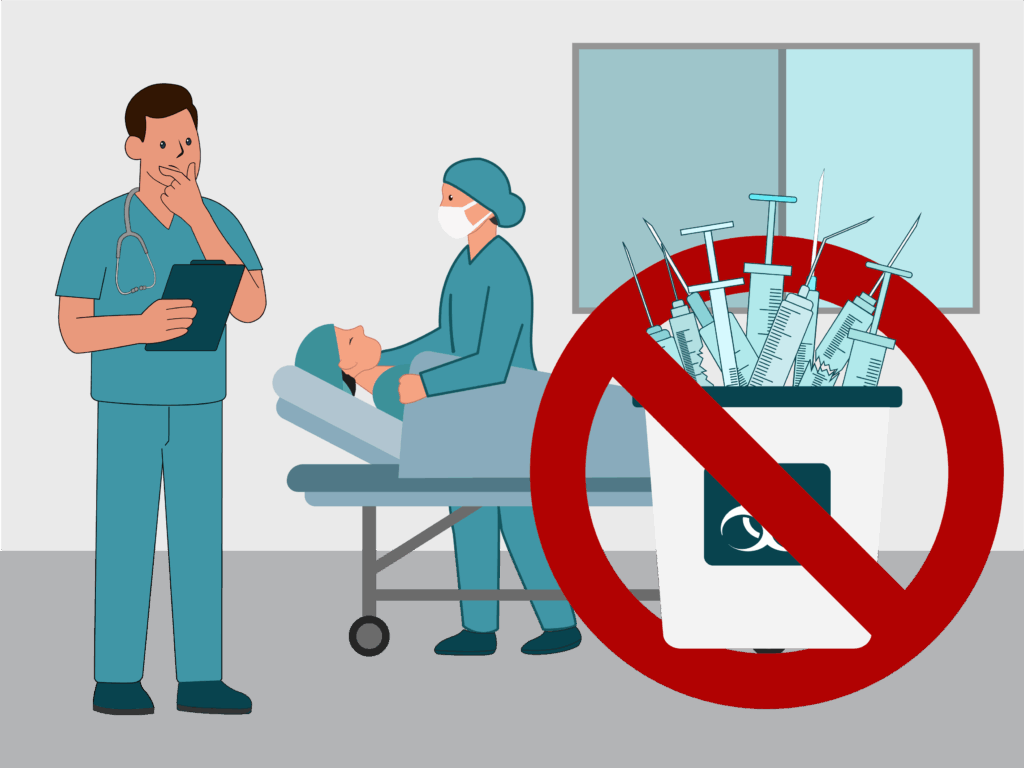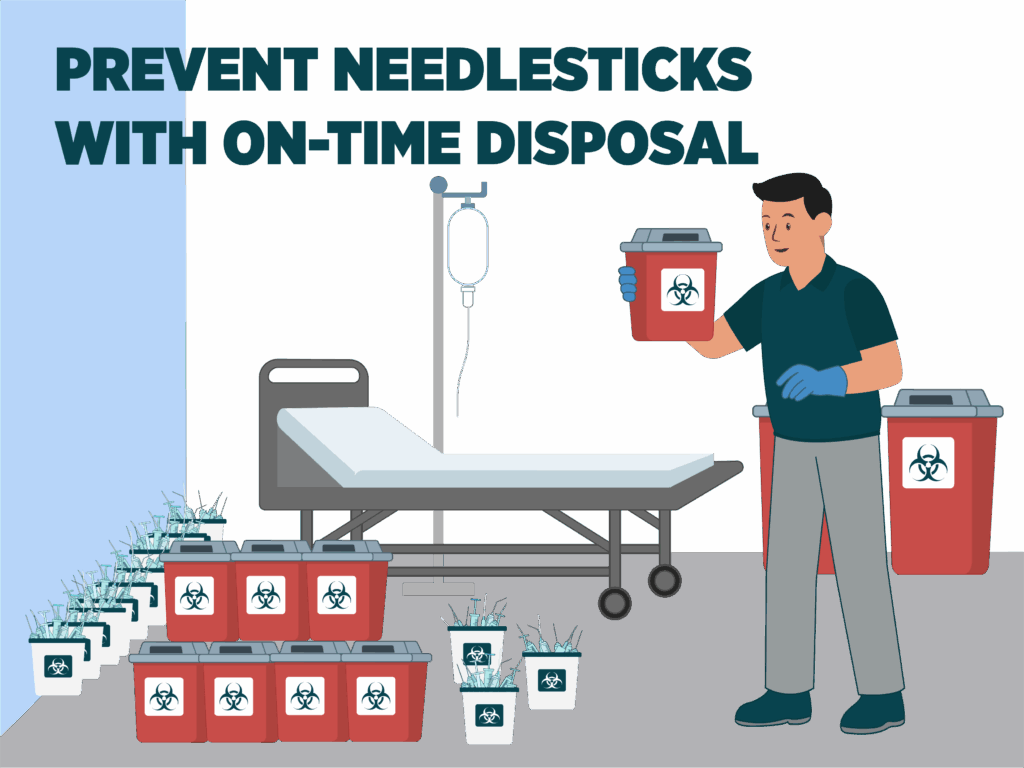When sharps containers fill up, there’s no time to waste. Delays in disposal can disrupt operations, increase infection risks, and lead to compliance violations.
To keep your facility running safely and smoothly, you need a sharps container disposal solution that’s fast, reliable, and built to prevent costly downtime.
Navigating Sharps Container Disposal Regulations
Several federal agencies regulate sharps container disposal:
- Occupational Safety and Health Administration (OSHA)
OSHA sets federal standards to protect healthcare workers from bloodborne pathogens. Its Bloodborne Pathogens Standard outlines using compliant sharps containers and safe disposal procedures.
- Environmental Protection Agency (EPA)
The EPA sets environmental standards. Under its Resource Conservation and Recovery Act (RCRA), the EPA regulates hazardous waste. This includes the safe treatment and disposal of pharmaceutical sharps.
- Department of Transportation (DOT)
The DOT regulates the safe transportation of hazardous materials, including medical sharps. They establish requirements for packaging, labelling, and transport to prevent leaks, spills, and injuries during transit.
- U.S. Food & Drug Administration (FDA) and Centers for Disease Control and Prevention (CDC)
The FDA and the CDC do not directly regulate sharps disposal services. But they provide useful guidelines for sharps container disposal management. The CDC also provides resources like the Sharps Safety Workbook for healthcare facilities.
Federal guidelines provide a baseline for compliance. State agencies use these guidelines as the basis for their regulations. For example:
- California requires manufacturers to fund and run sharps take-back programs under its statewide stewardship system.
- New York and Massachusetts require healthcare facilities to provide public sharps disposal options.
- Florida, Texas, West Virginia, and Delaware set specific rules for labelling, storing, and disposing of sharps waste, depending on facility type and waste volume.
- Multi-location facilities operating across state lines must follow varying regulations and face stricter compliance requirements than smaller sites.
State health agencies can impose fines. They can revoke licenses or take legal action for improper sharps disposal. Repeated violations may also jeopardize your DEA registration, threatening your ability to operate. To stay compliant, you need specialized knowledge and local expertise. Take the time to review your state’s regulations to ensure you meet all requirements, or choose a provider who can take that administrative burden off your shoulders and do it for you.
Best Practices in Sharps Waste Disposal for Every Facility
For Large Facilities and Multi-Site Operations
Hospitals and large healthcare systems generate high volumes of sharps waste. They need to manage disposal across multiple departments and locations. A standardized, compliant approach keeps operations smooth and risk-free.
- Centralize your waste tracking.
Use digital or cloud-based systems to track sharps from the point of use to final disposal. Monitor sharps container levels. Schedule pickups based on usage. Maintain an audit trail for compliance.
- Train your staff continuously.
Regularly train all your staff. Train your nurses, doctors, and staff on safe handling and proper segregation. Teach them about correct sharps container use and needlestick protocols. Reinforce best practices to reduce risk.
- Schedule your pickups strategically.
Prevent overflow by working with a provider that offers flexible pickup schedules. A waste disposal company like MedPro Disposal can tailor service to your facility’s needs, and respond quickly, especially on high-volume days.
In fast-paced healthcare settings, a minor delay in sharps disposal can be disruptive. When containers fill up quickly, your staff face safety risks. Delays or the lack of available containers lead to violations and unnecessary downtime. Implementing a continuous, compliant waste removal process keeps your operations efficient. It helps you maintain safety and avoid interruptions, even during peak patient volumes.
For Small Clinics and Pharmacies
Small clinics, practices, and pharmacies operate with limited staff and space. But preparing for compliance remains essential. Even with fewer resources, they can apply these practices for safe sharps container disposal.
- Use proper sharps containers.
Dispose of sharps immediately in FDA-cleared containers that are puncture-resistant, leak-proof, and labelled. Never recap, bend, or break needles. Seal at the fill line and never throw containers in the trash or recycling.
- Secure sharps containers.
Keep containers upright, secure, and within staff reach to prevent spills or contact by patients, children, or visitors.
- Consider mail-back programs.
Mail-back programs offer an easy, compliant solution for low-volume waste, especially in rural or remote areas. Providers like MedPro Disposal simplify this process with pre-labelled kits. Whether you run a small-town pharmacy or a high-volume practice, the goal remains the same: protect people, maintain compliance, and keep your operations running smoothly.
Legal Penalties for Improper Sharps Container Disposal Are Real and Costly
For Hospitals and Large Healthcare Facilities
Large facilities face significant scrutiny. Violations can lead to:
- Hefty fines and operational shutdowns.
Regulatory agencies may halt operations for serious breaches. For example, OSHA can fine serious violations over $15,000 per instance. Willful or repeated violations may reach over $160,000.
For instance, in 2024, OSHA issued six violations and a $27,300 fine to Essentia Health. The Minnesota-based healthcare system’s violations stemmed from inadequate safety equipment, exposure to contaminated sharps, insufficient training, and poor chemical hazard prevention. Essentia promptly addressed these issues after OSHA raised concerns.
- Reputational damage.
News of regulatory violations or safety lapses can spread quickly. Once the news is out, it can erode public trust and damage your brand. These incidents can severely harm your facility’s reputation.
They can also lead to patient attrition. Consequently, restoring credibility often requires extensive and costly public relations efforts.
For Small Clinics and Rural Practices
Smaller facilities aren’t immune. Small clinics and rural practices may generate less waste. However, improper sharps disposal still poses significant legal and safety risks for them.
Compliance becomes more challenging with limited resources. This can lead to serious violations, like:
- Environmental contamination.
Improper disposal can pollute local water sources and harm wildlife.
- Patient safety risks.
Full or unsecured containers increase the risk of needle-stick injuries. Accidental needlesticks or exposure to improperly contained sharps pose significant risks. These incidents can lead to serious infections for staff and patients.
Such incidents trigger immediate medical expenses, workers’ compensation claims, and potential lawsuits. These consequences severely strain a small practice’s limited resources.
Compliance extends beyond merely avoiding penalties. It fundamentally protects your patients, staff, and community. This commitment remains non-negotiable, regardless of your facility’s size.
Proper sharps disposal directly safeguards your finances and license. This proactive approach also ensures the well-being of your entire community.
Why a Reliable Sharps Disposal Services Provider Is Essential
Getting a reliable sharps disposal services provider is essential to your facility’s smooth day-to-day operations. The complexity of managing your sharps disposal and navigating all the regulations can be a huge burden.
A professional medical disposal company like MedPro Disposal will have the extensive experience and expertise to help you with sharps waste disposal and health compliance.

Outsourcing your sharps disposal services offers significant benefits. Choosing a licensed provider ensures:
- Regulatory compliance.
A provider will help you stay current with federal and state regulations. This expertise will help ensure your facility consistently meets all legal requirements. That means providing essential documentation for audits and compliance inspections.
- Enhanced safety.
The right provider will minimize the risk of needlestick injuries for your staff. They will follow strict safety protocols during collection, transport, and disposal.
- Operational efficiency.
The right provider frees you up to focus on patient care. They will eliminate your burden of managing your waste streams. They will help streamline your internal processes and prevent operational bottlenecks and workflow disruptions.
When selecting a sharps disposal services provider, look for the following qualities:
- Duly licensed and insured.
Your provider must possess all necessary federal, state, and local licenses and maintain comprehensive insurance coverage.
- Offers flexible pickup schedules.
Select a provider that aligns with your facility’s needs and operational hours. This avoids overfilling containers and ensures no disruption to your daily workflow.
- Provides comprehensive documentation.
A reliable provider provides clear, accurate documentation for every pickup, including waste manifests and certificates of destruction.
Why MedPro Should Be Your Sharps Container Disposal Provider
MedPro Disposal provides reliable sharps disposal services. Our reach, resources, and responsiveness allow us to fit your needs without compromising your internal processes.
The urgency of proper disposal, increasing regulatory scrutiny, and rising patient volumes underscores the absolute necessity of robust waste management practices. Delays risk your staff, patients, and operations. MedPro can help you mitigate your waste disposal needs so you can focus on what truly matters: your patients.
Ready to optimize your sharps container disposal and keep your facility running smoothly and safely?
Call Us Today for Your Free Quick Quote: 888-641-6131. Want to learn more? Visit our website to explore our full suite of comprehensive medical waste disposal solutions.







